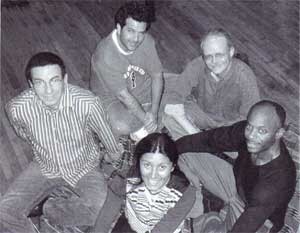Mandara
Mandara, Exploring World Music Roots
By Rich Holly
(Percussive Notes, October 1996)
Mandara is a fascinating assemblage of instrumentalists and vocalists from diverse 
ethnic and musical backgrounds. Their PASIC ’96 Showcase Concert will explore the African roots of American music. Included in the presentation will be Dagari music of Upper-West Ghana utilizing traditional xylophone, hand drum and voices, contemporary Shona music for marimba ensemble, and original works that include such styles as South African Mbqanga and Liberian Jibo.
In the spirit of music as a unifying force for the world’s peoples, Mandara’s original music combines marimba, vibes, piano, bass, keyboards trombone, drum-set and vocals with traditional instruments from Ghana, Burkina Faso, the Ivory Coast, South Africa and the Caribbean.
“There is so much to be gained, both musically and otherwise by studying the musical activity of the Dagari nation,” says Valerie Naranjo, who co-leads Mandara with Barry Olsen. “They successfully take music and other arts beyond the realm of concert and audience directly into the entire community, thereby building a common healing and invigorating language for the people.”Naranjo’s own love for community music involvement comes from her experiences as a child. As a descendent of Navajo and Ute Native American tribes, she learned and witnessed first-hand how meaningful such experiences can be. “I was fortunate to grow up with the traditions I did.” she says. “At weddings and funerals, and for that matter other significant occasions, musicians were called in. These musicians were seen as healers, and this intrigued me.”
Naranjo received he B.A. in Music Education from the University of Oklahoma, and her M.A. in Performance from Ithaca College. She has studied with Leigh Howard Stevens, Gordon Stout, Dave Samuels, Abraham Adzenyah, Godwin Agbeli, Kofi Missiso, Kakraba Lobi, and Babatunde Olatunji. In addition to her performances with Mandara, Naranjo has performed and recorded with Philip Glass, David Byrne, Airto Moreira and the “Saturday Night Live” Band.
One particularly thrilling performance was for the chief of the Ghanaian village Lawra. Naranjo’s intention was to study the language and the indigenous instrument gyil (traditional xylophone) with the three masters in the village. She discovered that women do not traditionally play the gyil, but upon her performance, the chief got up and danced. She later found out that the chief only dances when he has something important to announce. After conferring with other village leaders, the chief announced that, from this day forward, women shall be allowed and encouraged to play the gyil.
Naranjo has also written music for many choreographers and has been awarded grants from the National Endowment for the Arts, Composers Forum, and Meet the Composer.
Barry Olsen’s musical background includes composing and arranging in addition to performing. His artistry may be heard on recordings by, among others, David Byrne, Paul Simon, Ray Barretto, Eddie Palmieri, Airto Moreira, and Paquito de Rivera.
Mandara has performed to rave reviews all over the world. The Washington Post called their music “delicate, intense, incantory,” while The Chicago Sun-Times described their musicianship as “wonderfully versatile. Mandara has recently performed at Lincoln Center, the Kennedy Center, on a tour of Japan, and as performers at festivals in Europe, Africa, and Mexico.
